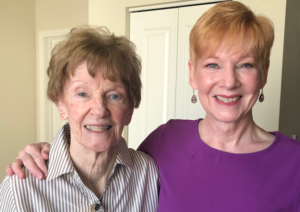 How My Mother Still Teaches Me about This
How My Mother Still Teaches Me about This
My mother has Alzheimer’s. I don’t tell you this for sympathy or a donation, but because it sparked my need to better understand kindness.
Most people struggle to define kindness—ending up with “I know it when I see it.” After looking at a lot of other people’s tries, I pulled together what seemed the best from all of them:
“Being sensitive to those in need, then doing something to help without expecting anything in return.”
The idea that kindness requires action is something I hadn’t thought about. It seems like a “duh!” now. I can have all the kind thoughts and good intentions in the world, but they’re meaningless until I act on them.
The Gift of Kindness to Your Brain and Body
The research is pretty compelling:
- Kindness releases dopamine, a hormone and neurotransmitter associated with the pleasure center of your brain
- It releases serotonin, a neurotransmitter that regulates mood and helps us feel happy
- It releases oxytocin, a hormone associated with love, trust, bonding with those around us, empathy, and communicating in a positive way
This powerful chemical combination has a number of benefits for the rest of your body and self:
- It reduces inflammation
- It strengthens your vagus nerve—the link between your head and heart—promoting physical health and connection to others (Dr. Barbara Fredrickson at the University of North Carolina at Chapel Hill)
- It leads to longer and happier lives, reducing depression and anxiety
The good news is that exercising kindness becomes a positive feedback loop: the more you do it, the easier it becomes to do it some more. This is important, because the “helper’s high” you get from kindness lasts about three to four minutes.
If It’s So Great, Why Aren’t We Kinder?
There seem to be three big reasons.
First, seeing—or even imagining—someone in pain activates the pain centers in our brain. Because the brain’s primary purpose is to keep us alive, our knee-jerk response is to run away from pain.
We can think it’s better to harden our hearts to protect ourselves. One example is to put distance between us and othersby being judgmental. We can blame people who are suffering by believing they brought this on themselves.
Second, from an evolutionary perspective, “modern society” developed much faster than our ability to keep up with it. Our nervous system wasn’t designed to be chronically triggered. This means our bodies are constantly releasing inflammatory proteins, and our immune system is less able to react to threats.
Dr. James Doty, at Stanford University, explains, “We have an epidemic of stress, anxiety, and depression. Our overstimulated nervous systems also make us more reactive and quicker to jump to judgments about others.” This constant state of stress and anxiety reduces our capacity for kindness.
Third, we often feel overwhelmed by our workloads and personal commitments. For more than 95% of human history, people have had more free time than we do now.
It becomes much easier to manage this by narrowing our focus to what’s in front of or directly affects us. Refugees of wars in foreign countries or polar bears in the Arctic are far away, and it’s easier to put them out of our minds.
Choosing to Act
Because my mother is in memory care in another state, I can’t be there as often as I’d like. That means I rely on the kindness of others. And I was feeling guilty about this.
But the idea of kindness requiring action made me think. If I couldn’t help her, I certainly could help others in my community. Last weekend, I did my first run as a Meals on Wheels driver: delivering food to people in need.
I fumbled with some of the technology. That meant I had to ask the people who were receiving the meals to have patience and help me. Their acceptance and assistance reduced my embarrassment and increased my relief. All of us were smiling by the end of my visit.
Expressing Your Kindness as a Leader
Kindness is a big part of creating a positive culture in any organization. Research shows people thrive in a place that’s creative, inclusive and rewarding, and bolstered by firm, healthy boundaries: in an environment that’s kind.
What will you do to express kindness today? Make a difference for others—and benefit from that boost yourself.
